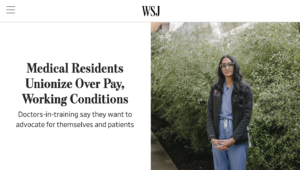Process of Organizing a Union
Step 1
Assemble an organizing committee.
Step 2
Identify the top workplace issues and concerns to be addressed.
Step 3
Sign a secure, confidential union authorization that authorizes UAPD to represent us for collective bargaining for a new contract. Only UAPD and the National Labor Relations Board (NLRB) will know that you signed.
Step 4
File with NLRB requesting a union election.
Step 5
Conduct an election on whether to unionize with UAPD (vote YES or NO). The election will be conducted either via mail-in ballot or in person. NLRB will let us know the date and modality of the election. If the election is held via mail. A ballot will be mailed to you at the address on file with our employer.

NOTE: The NLRB ballot is completely anonymous, secure, and confidential. Your ballot will be assigned a number that de-identifies you–your name will NOT be on the ballot!
Step 6
Get out the vote! To win the election. We must secure 50% of the vote plus 1.
Example: Out of 800 votes—we must get 401 “yes” votes.
Step 7
Upon election victory, UAPD will begin collective bargaining on our behalf with our employer for a fair and just contract.
In The News
Wall Street Journal: “Medical Residents Unionize Over Pay, Working Conditions: Doctors-in-training say they want to advocate for themselves and patients”: https://www.wsj.com/articles/medical-residents-unionize-over-pay-working-conditions-11673832067
Helpful Links
UAPD: www.uapd.com
National Labor Relations Board: www.nlrb.org
The Five Basic Steps to Organizing a Union: https://www.ueunion.org/org_steps.html

Residents and Fellows:
Contact [email protected] for more information or to file grievances.
“Make no mistake, come September 3rd, when we strike, the powers that be are going to cast blame at us; 831 physicians. They are going to say that we’re jeopardizing patient care, or that we have a moral obligation to go back to work. They are going to play on our innate sense of empathy for our patients. but let me say out loud what we all know is true; when we strike, every patient that receives inadequate treatment here, every second more a patient waits in the ER, every stress placed on our healthcare colleagues, and every family member who suffers from this work disruption is the result of corporate greed and the continued decision not to do what is right. Nothing more.”
– Dr. Steve Moran, PGY2 Internal Medicine



